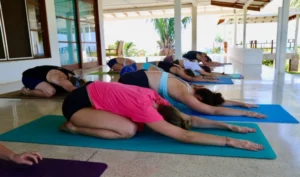The practice of yoga has been around for thousands of years. It has been recognized for its numerous health benefits, both physical and mental. One of the most valuable aspects of yoga is its ability to promote mental and emotional well-being. This is why a therapeutic yoga teacher training course can be especially beneficial for mental health workers. Whether you are a therapist, counselor, social worker, or psychologist, yoga teacher training can provide you with tools to help your clients. Yoga can help mental health professionals teach the following skills: management of stress and anxiety, improvement of mood, and self-awareness.
In this blog, we will explore the benefits of a therapeutic focused yoga teacher training for mental health workers. This will include the ways in which yoga can complement traditional therapy and how yoga teacher training can enhance your skills as a mental health professional.

Yoga as Complementary to Traditional Therapy
Many mental health workers use various forms of therapy to help their clients manage mental health issues. However, traditional talk therapy can sometimes be limited in its ability to address physical and emotional stressors. This is where yoga teacher training comes in. By teaching breathing techniques, postures, and meditation, yoga teacher training can provide mental health workers with a complementary approach. This approach can help their clients manage stress, reduce anxiety, and improve their overall mental health.
For example, yoga can help improve mental health in clients with depression and anxiety by reducing symptoms and helping to regulate emotions. In addition, yoga has been shown to be effective in reducing symptoms of post-traumatic stress disorder (PTSD). It has also been shown to be effectiev at helping individuals who suffer from addiction.
One source that supports this statement is a review article by Cramer et al. (2013) titled “Yoga for anxiety: a systematic review and meta-analysis of randomized controlled trials”. The review analyzed the mental health of participants in 36 randomized controlled trials and found that yoga interventions were effective in reducing symptoms of anxiety.
Another source is a systematic review by Galantino et al. (2016) titled “The Effectiveness of Yoga for Depression: A Critical Literature Review”. The mental health review analyzed 14 studies and found that yoga interventions showed promise in reducing symptoms of depression.
Regarding PTSD, a study by van der Kolk et al. (2014) titled “Yoga as an Adjunctive Treatment for Posttraumatic Stress Disorder: A Randomized Controlled Trial” found that yoga was effective in reducing PTSD symptoms and improving quality of life compared to treatment as usual.
Regarding addiction, a study by Bhatia et al. (2013) titled “Effect of Yoga-Based Intervention in Patients with Alcohol Dependence Syndrome” found that yoga interventions significantly reduced alcohol craving and anxiety in individuals with alcohol dependence syndrome, thereby increasing mental health.
By incorporating yoga into their therapy sessions, mental health workers can provide their clients with a more holistic approach to their mental health, one that incorporates both talk therapy and physical practices.
Enhance Your Skills as a Mental Health Professional
In addition to providing a complementary approach to therapy, a therapeutic focused yoga teacher training can also enhance your skills as a mental health professional. By learning about the practice of yoga and its benefits, you will gain a deeper understanding of the mind-body connection. This will enable you to better help your clients.
For example, yoga teacher training will teach you how to use breathwork and meditation to help your clients downregulate their nervous systems. These practices can also help them equalize their emotions, and reduce stress. In a therapeutic focused yoga teacher training course, you will also learn how to use postures to address specific physical and mental health concerns. These include such as back pain, anxiety, and depression. These tools can be used to help your clients become more aware of their physical and emotional states and make positive changes.
In addition, yoga teacher training can provide you with a deeper understanding of the principles of mindfulness, which can be incredibly valuable when working with clients who struggle with anxiety, depression, and other mental health issues. By incorporating mindfulness into your therapy sessions, you can help your clients develop greater self-awareness and self-compassion, which are essential for mental health and well-being.
Improved Self-Care through Yoga Teacher Training for Mental Health Professionals

As a mental health worker, it is important to prioritize your own well-being in order to be effective in helping others. Yoga teacher training can help you do just that. By learning about the practice of yoga and incorporating it into your life, you can improve your own physical and mental health, reduce stress, and enhance your overall sense of well-being.
In addition, a therapeutic focused yoga teacher training can provide you with tools to help manage stress and improve your work-life balance. For example, you will learn breathing techniques and meditations that you can use throughout the day to stay calm and centered, even in challenging situations. You will also learn postures that can help you manage physical stress and improve your posture and alignment.
Finally, by incorporating yoga teacher training into your life, you will develop a deeper sense of self-awareness, which can help you identify areas in your life that may be causing stress or affecting your well-being.
How Can I Find A Therapeutic Focused Yoga Teacher Training for Mental Health Professionals?
Not all yoga teacher training courses have a therapeutic focus. We suggest you take time to research a program that is just right for you. There are Yoga Teacher Training programs fully online, others are offered in person over the weekends and others in destination retreat settings worldwide. Online Yoga Teacher Training courses help you fit the training into your already busy life, while immersions are a step away from busy life to immerse yourself in the teaching in a beautiful healing environment. At Soma Yoga Institute we offer 200 hour Therapeutic Yoga Teacher Trainings online and in person.

References:
Galantino, M. L., Galbavy, R., & Quinn, L. (2016). The effectiveness of yoga for depression: A critical literature review. International Journal of Yoga, 9(3), 205-212.
Bhatia, T., & Dhar, N. (2013). Effect of yoga-based intervention in patients with alcohol dependence syndrome. Indian Journal of Psychiatry, 55(Suppl 3), S357-S363.